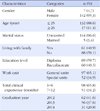Abstract
Purpose
The purpose of this study was to identify the effect of Psychosocial health and Self-nurturance on the experience of new graduate nurses.
Methods
A cross-sectional survey design was used. The participants in this study were 149 nurses who had less than 12 months of nursing experience and were working at one of 4 general hospitals. The data were collected by a self-administered questionnaire from Nov. 2012 to Oct. 2014.
Results
The total mean score for Psychosocial health was 3.07±0.60, Self-nurturance, 3.38±0.44, and graduate nurse experience, 2.59±0.27. The effect of Psychosocial health and Self-nurturance predicted 23% of variance in graduate nurse experience.
Conclusion
These results indicate that Psychosocial health and Self-nurturance have a positive relationship to graduate nurse experience. Therefore, further studies including approaches that support Psychosocial health and Self-nurturance are recommended to help in the adaptation of newly graduated nurses to clinical settings.
Figures and Tables
References
1. Kim JH, Hyun MY, Kim YS, Kin JS, Nam SO, Song MS, et al. Psycho-social well-being, health perception and behavior among clinical nurses. J Korean Acad Nurs Adm. 2010; 16(1):26–36. DOI: 10.11111/jkana.2010.16.1.26.
2. Hensel D. Relationships among nurses' professional self-concept, health, and lifestyles. West J Nurs Res. 2011; 33(1):45–62. DOI: 10.1177/0193945910373754.
3. Nahm ES, Warren J, Zhu S, An M, Brown J. Nurses' self-care behaviors related to weight and stress. Nurs Outlook. 2012; 60(5):E23–E31. DOI: 10.1016/j.outlook.2012.04.005.
4. American Association of Colleague of Nursing. The Essentials of Baccalaureate Education for Professional Nursing Practice. [Internet]. Washington, DC: American Association of Colleague of Nursing;2008. cited 2015 September 15. Available from: http://www.aacn.nche.edu/education-resources/BaccEssentials08.pdf.
5. Yoon SH. A study on new graduate nurses' clinical experience of adaptation. J Korean Acad Nurs Adm. 2002; 8(1):55–72.
6. Fink R, Krugman M, Casey K, Goode C. The graduate nurse experience: Qualitative residency program outcomes. J Nurs Adm. 2008; 38(7-8):341–348. DOI: 10.1097/01.nna.0000323943.82016.48.
7. Yoon SH, Kim BS. New graduate nurses' stress, stress coping, adaptation to work, and job satisfaction: Change comparison by personality. J Korean Acad Nurs Adm. 2006; 12(3):491–500.
8. Nemcek MA. Registered nurses' self-nurturance and life and career satisfaction. AAOHN J. 2007; 55(8):305–310. DOI: 10.1177/216507990705500802.
9. Lyubomirsky S, King L, Diener E. The benefits of frequent positive affect: Does happiness lead to success? Psychol Bull. 2005; 131(6):803–855. DOI: 10.1037/0033-2909.131.6.803.
10. Schmitz MJ. Alexithymia, self-care, and satisfaction with life in college students [dissertation]. Columbia, MO: University of Missouri-Columbia;1999.
11. Seal TLT. Correlates and predictors of high self-nurturance [dissertation]. Kansas City, MO: University of Missouri-Kansas City;1995.
12. Stark MA, Hoekstra T, Hazeland DL, Barton B. Caring for self and others: Increasing health care students' healthy behaviors. Work. 2012; 42(3):393–401. DOI: 10.3233/WOR-2012-1428.
13. Henry JD, Henry LS. The self-caring nurse. Strategies for avoiding compassion fatigue and burnout. Okla Nurse. 2004; 49(1):9.
14. Kim YS, Park KY. The mediating effect of professionalism in the relationship between clinical competence and field adaptation in newly graduated nurses. J Korean Acad Nurs Adm. 2013; 19(4):536–543. DOI: 10.11111/jkana.2013.19.4.536.
15. Shin YW, Lee H, Lim Y. Predictors of clinical competence in new graduate nurses. J Korean Acad Nurs Adm. 2010; 16(1):37–47. DOI: 10.11111/jkana.2010.16.1.37.
16. Ji EO. A study on field adaptation of new nurses. [master's thesis]. Seoul: Ewha Womans University;2009.
17. Pejtersen JH, Kristensen TS, Borg V, Bjorner JB. The second version of the Copenhagen Psychosocial Questionnaire. Scand J Public Health. 2010; 38(3):suppl. 8–24. DOI: 10.1177/1403494809349858.
18. Lehman AK, Rodin J. Styles of self-nurturance and disordered eating. J Consult Clin Psychol. 1989; 57:117–122.
19. Casey K, Fink R, Krugman M, Probst J. The graduate nurse experience. J Nurs Adm. 2004; 34(6):303–311.
20. June KJ, Choi ES. Reliability and validity of Korean version of the Copenhagan Psycho-social Questionnaire scale. Korean J Occup Health Nurs. 2013; 22(1):1–12. DOI: 10.5807/kjohn.2013.22.1.1.
21. Nemcek MA, James GD. Relationships among the nurse work environment, self-nurturance and life satisfaction. J Adv Nurs. 2007; 59(3):240–247. DOI: 10.1111/j.1365-2648.2007.04309.x.
22. Duffy VJ. The conflict of nurturance for women: implications for self-esteem and depression [dissertation]. Rochester, NY: University of Rochester;1992.
23. Turkel MC, Ray MA. Creating a caring practice through self-renewal. Nurs Adm Q. 2004; 28(4):249–254.
24. Peterson J, Hall LM, O'Brien-Pallas L, Cockerill R. Job satisfaction and intentions to leave of new nurses. J Res Nurs. 2011; 16(6):536–548. DOI: 10.1177/1744987111422423.
25. Goode CJ, Lynn MR, McElroy D, Bednash GD, Murray B. Lessons learned from 10 years of research on a post-baccalaureate nurse residency program. J Nurs Adm. 2013; 43(2):73–79. DOI: 10.1097/NNA.0b013e31827f205c.
26. Rush KL, Adanack M, Gordon J, Janke R, Ghement IR. Orientation and transition programme component predictors of new graduate workplace integration. J Nurs Manag. 2015; 23(2):143–155. DOI: 10.1111/jonm.12106.
27. Carlson GD, Warne T. Do healthier nurses make better health promotors? A review of the literature. Nurse Educ Today. 2007; 27(5):506–513. DOI: 10.1016/j.nedt.2006.08.012.
28. Glembocki MM, Dunn KS. Building an organizational culture of caring: Caring perceptions enhanced with education. J Contin Educ Nurs. 2010; 41(12):565–570. DOI: 10.3928/00220124-20100701-05.




 PDF
PDF ePub
ePub Citation
Citation Print
Print







 XML Download
XML Download